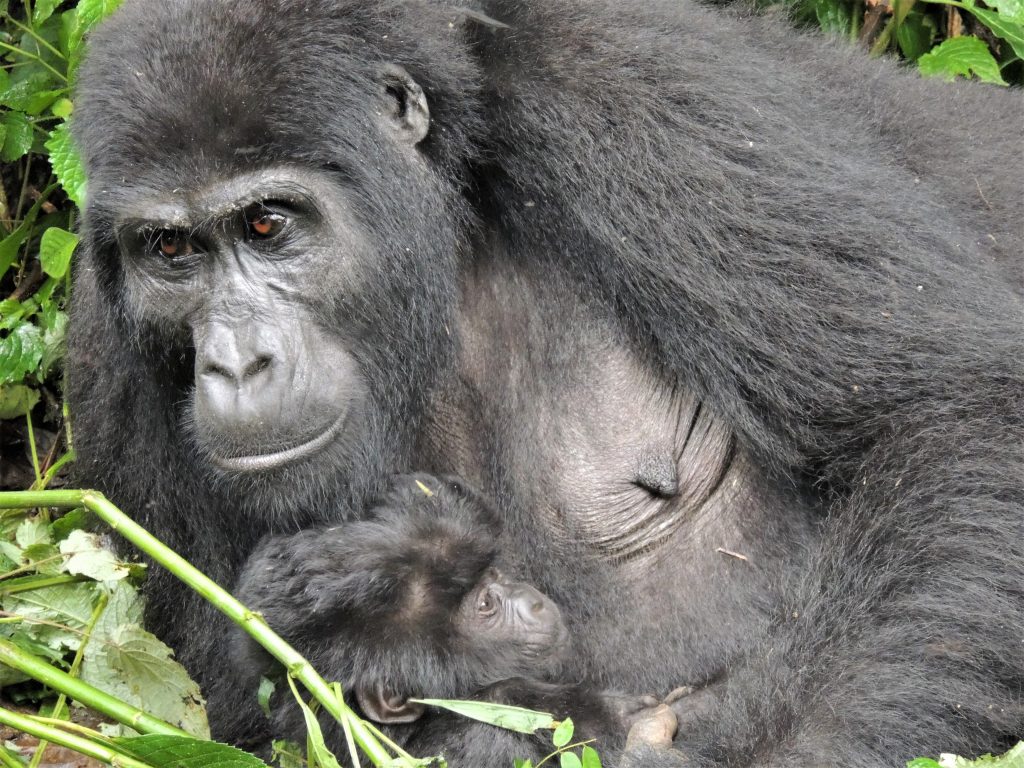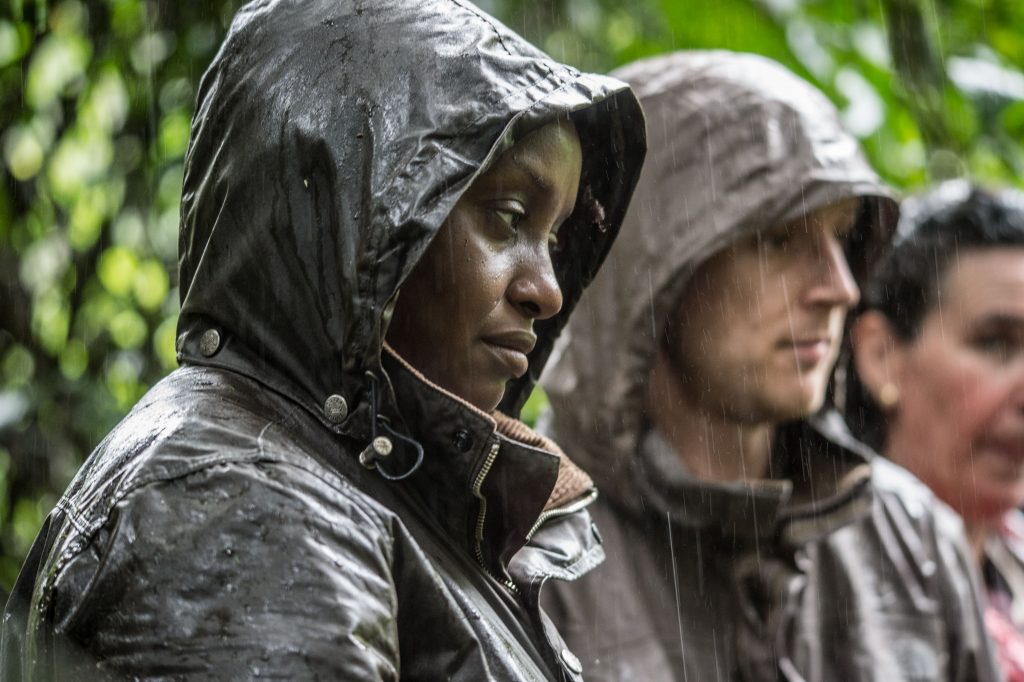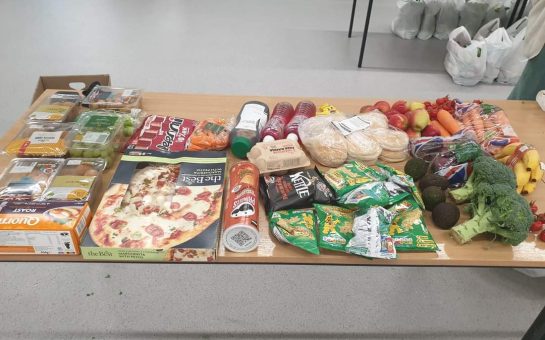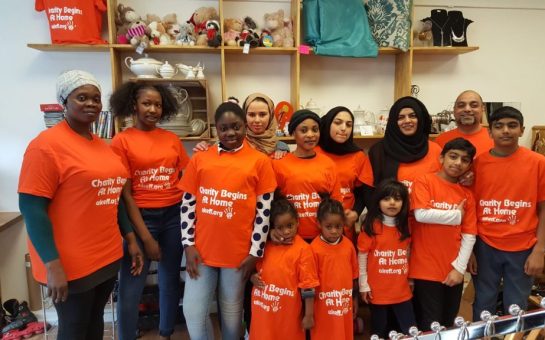“They don’t have anything to eat”: Conservation Through Public Health is on a mission to save Uganda’s gorillas from poaching by providing food to vulnerable communities.
Tucked away in western Uganda, a 10-hour drive from the capital Kampala, accessed by winding dirt roads that hug precipitously steep mountainsides, is the aptly named Bwindi Impenetrable National Park.
Here, in ancient rainforests perched on top of extinct volcanoes, are some of the few remaining mountain gorillas left in the world.
There are around 600 mountain gorillas in Bwindi, making up half of the global population of these tragically beleaguered apes.
Their numbers have been steadily rising, thanks to the work of conservation groups and the Ugandan Wildlife Authority (UWA), who are dedicated to bringing the gorillas back from the brink of extinction.
But this year, a new threat emerged, one which few people were prepared for: COVID-19.
The pandemic has severely impacted conservation efforts in Bwindi through lack of tourist dollars, increased hunger leading vulnerable groups to poaching, and more opportunities for poachers to enter the forests undetected.
Although the pandemic did not hit Uganda hard- official figures point to just over 10,000 cases and fewer than 100 deaths- it did stop the tourist trade.
Tourists to Uganda mainly come from the countries that bore the brunt of the coronavirus pandemic: USA, UK, France, and other European countries.
The sudden halt in tourism to Uganda had a more catastrophic impact than the disease itself. Hotels closed, sending their workers home; the UWA stopped selling tourist permits, wiping out about $12 million in funding; craftspeople and guides in tourist hotspots suddenly had no income.
Gad Turyatemba, camp manager at the Gorilla Conservation Camp, said: “[The pandemic] terribly affected us as there has no business going on.
“We are living in a poor state due to COVID-19 that hit globally, but we pray hard that things get back to normal soon.”
Porters, members of the community in Bwindi who would carry tourists’ backpacks on the arduous climb to the gorilla habitats, would make upwards of $15 a day from tourists, more than some members of the community could make in two weeks.
Many porters are reformed poachers. Now that income has completely stopped.
Dr Gladys Kalema-Zikusoka, founder and CEO of Conservation through Public Health (CTPH), also points to the fact that tourists themselves deter poachers from entering the park.
She said: “When you go into the park as a tourist, you’re kind of like a law enforcement.
“Wherever there are tourists, people walking in the forest, a poacher is not going to go there, they don’t want to get caught.
“But now you don’t have that traffic in the protected area then a poacher can easily come.”
All this meant that poaching has doubled across Uganda since the pandemic started.

On June 1, the crisis culminated in the tragic killing of the silverback Rafiki at the hands of a poacher, which sent shockwaves through the conservation community in Uganda.
In the Swahili language, Rafiki means “Friend”, a name given to him due to his friendly, trusting nature around people, which probably led to his death.
Deaths of silverbacks- the head male in a family group- cause complex social shifts in the gorilla family structures.
Left without a leader, five of the Nkuringo family left, depleting the group’s numbers.
Dr Kalema-Zikusoka believes that the poacher was driven by hunger.
“He was among vulnerable communities. Partly we think what drove him into the park was hunger and desperation,” she said.
The poacher was not in the forest to hunt gorillas, but rather the bush-pigs and duiker that live in the same area as the apes.
The poacher claimed that he was acting in self-defence, and that he was attacked by Rafiki.
Dr Kalema-Zikusoka is sceptical of the claim, saying that Rafiki wouldn’t attack the poacher, but instead the man may have speared the gorilla due to fright.
“Rafiki has grown up all his life seeing human beings. And he knows that everyone is good.
“He doesn’t know between a good person and a bad person. He speared Rafiki because he may have never been that close to a gorilla before and he freaked out.”
Nevertheless, the poacher was arrested by the authorities and jailed for 11 years- the highest jail term for poaching.

Rather than demonising the poachers for their actions, CTPH saw the need to address the hunger which caused the poacher to enter the forest in the first place.
Dr Kalema-Zikusoka said: “We’re very concerned about the hunger in the community.
“We realised that they need to be eating.
“The government has been providing emergency food relief in the form of food that you cook and eat, but that’s very temporary.
“We realised that these people have gardens, they need to get back to what they did before tourism began.
They used to feed themselves by planting food in their gardens.
“So, we thought of providing fast growing seedlings so that they can quickly have something to eat.”
To help, the conservation group has launched an initiative to feed those in the community.
Spearheaded by the organisation’s agronomist, they are aiming to provide fast growing seedlings to the vulnerable communities, to provide them with enough food to last until the tourist money comes back.
Dr Kalema-Zikusoka said: “These fast-growing seedlings mean that they don’t have to enter the forest because they’re hungry.
“As we provide them, we want to tell them: ‘This is because of the gorillas, please don’t go into the forest, we have to protect the gorillas’.”
The group has created a thriving nursery bed of plants such as potatoes, kale, spinach, maize and tomatoes- crops which only take a few months to grow.
Their plan is to distribute these seeds to the senior members of the local communities and teach them how to farm these crops in a sustainable manner, using proper soil and water conservation techniques.
Dr Kalema-Zikusoka points to this as a long-term initiative, not just a quick response to the pandemic.
“Even when tourism comes back, they won’t need the tourism money to feed themselves.
“The tourism money will just be there for something additional. But not to feed themselves. It’s both a short and a long-term measure.”
It is hoped that, with access to these crops, the poachers will not be driven into the forest to hunt for food, and gorillas like Rafiki will be able to live in peace.
To find out more about the work of CTPH, visit: https://ctph.org/
Main image courtesy of CTPH



